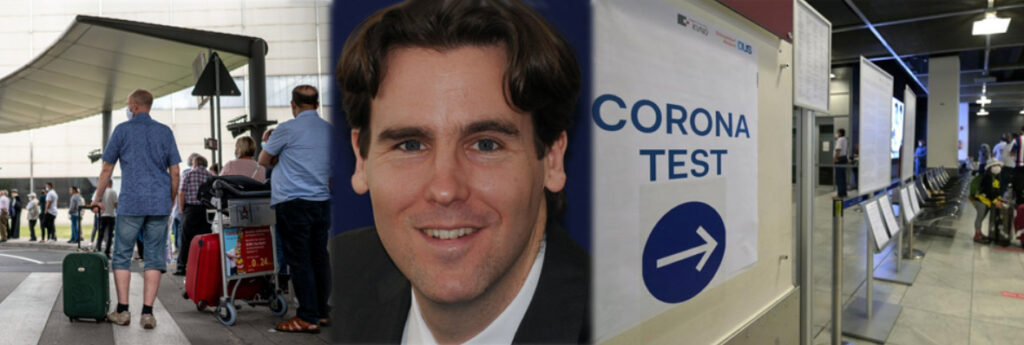Traveller testing at airports will be a fact of life for at least the next 12 to 18 months, predicts a senior European airline executive. And during that time, don’t be surprised to see it evolve to become a premium service offered by airlines, not unlike first-class security lines.
In fact, Lufthansa is already working on the latter concept as COVID-19 testing procedures evolve and improve, says Dr. Bjoern Becker, senior director product management ground & digital services at Germany’s Lufthansa Group (LHG).
“Don’t misunderstand me, testing is not a premium service, testing is a service for every customer – as we do it today, we want to do it in the future also,” says Becker. But he adds, “The only thing is, we have different touchpoints throughout the airport for our customers – for example, at security and at boarding, and this is what we also want to do for testing.”
One example would be a fast-track line for first- and business-class passengers at the test facility; another would be to test with (quicker) antigen tests (before they become the norm)
Such a service would be especially welcome to frequent flyers, Becker says.
The Lufthansa exec says testing for coronavirus has come a long way since the pandemic went global in March.
“At the beginning nobody really knew how to take care of the pandemic… but now we are at the end of September and we know a lot more about this pandemic and we know a lot more about what testing can do for us.”
He adds, “It’s not just about Lufthansa, it’s about all the airlines, and it’s about the other businesses; people need to travel to be successful and we need to support this.”
And with careful testing that can happen, he says, suggesting that it should be done in both destinations of a trip.
He admits that testing is not foolproof and there is risk in everything in life, but adds, “This is so low, it’s manageable.”
And with no mention of a vaccine, he adds, “This is our big hope to get travel going again.”
Already, LH test facilities are opening in German gateways and the airline is looking at doing the same in both American and Canadian airports, says Becker, who adds the airline is also looking into new test methods.
These include “next generation” antigen tests, which do not require machines to process. Much like pregnancy tests, they can produce results in about 15 minutes, though are not yet considered as reliable as PCR tests and to date they are not universally validated, which is an obstacle for use.
However, PCR tests take a minimum two to three hours to produce results and more likely four to six hours when scaled up to mass-market numbers at an airport, Becker says, making them time consuming and cumbersome for passengers who cannot simply take them immediately before departure.
At the same time, regional testing capacities are generally limited, prompting Lufthansa to go so far as to build its own labs in order not to depend on third-party facilities.
He says that Lufthansa will begin using the antigen tests in October, adding, “That’s definitely the next thing to come and I’m really excited about it because this gives us a lot more opportunities to provide services for our guests.”
However, Becker is quick to point out that airline/airport testing is more than simply a future profit centre. In fact, the main motivation, he says, is to allow people to start travelling again safely, especially in an environment where “99 per cent of people in a country are not infected,” but still face blanket travel bans.
He adds there also an altruistic motive.
“We are helping (fight COVID) by bringing statistics to (the German government),” thereby identifying trends and infection rates in destinations that can be used to fight the pandemic, and stats that can sometimes present a more intimate picture of the virus’s spread than is generally perceived.
“Beyond whether people are coming from a risk country, or not, we’ll be able to explain why people are infected or not. And that’s very important.”
Becker is adamant that the airline is not looking to “cannibalize” public testing.
In fact, it’s quite the opposite, he says, with the testing service being a significant help to authorities in regions where testing facilities are limited or lacking. He notes that in Frankfurt alone, the airline has the capacity to test 20,000 people a day, thereby reducing the burden on public health.
He concludes: “The message here is: Testing is important, testing will stay for at least for the next 12 to 18 months – and not only that, we look at new test methods and develop this, and also develop new services, but we will also integrate this into our premium service environment, so that our premium guests can get a good service, and our economy guests, obviously, but we want to be and stay a frontrunner.
“We are doing our best to manage this (pandemic) and to protect us and protect our guests, and to make travel as enjoyable as possible again.”

